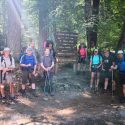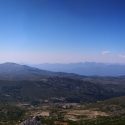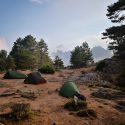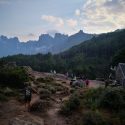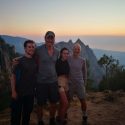203 (Welsh) Field Hospital is an Army Reserve unit based in Cardiff with detachments locations spread across north and south Wales. The unit planned and ran Exercise Dragon Corse 2 which was a level 3 Adventure Training (AT) expedition to Corsica which ran from the 13th July 2018 to the 4th August 2018. With the aim to take members of the unit and other members of the Army Reserve to complete the whole and or parts of the GR20 route.
GR stands for Grande Randonnée, which means big excursion in French, and they are a network of long-distance footpaths in Europe, mostly in France, Belgium, the Netherlands and Spain. Its Corsican name is Fra li monti what means “across the mountains”. The GR20 is a long-distance trail that traverses Corsica diagonally from the north west to the south east. It’s 180km long with variation in height of about 10 000 metres and can be walked in around 15 days, however the record is 32 hours! It is considered to be the most difficult of all the GR routes and one of the most beautiful mountain trails in Europe.
The expedition was led by Staff Sergeant James Bell and Colonel Guy Cooper who are both qualified mountain leaders and were responsible for the running of the expedition phase, which included the management of the group and ensuring the safety and welfare of all the participants. The planning and majority or pre- expedition administration had been carried out by another member of 203 Field Hospital. In addition to the walking groups, two supporting staff acted as drivers and the Real Life Support team for the duration of the expedition, and provided vehicle cover in case of an emergency and scheduled resupply meetings.
The 21 military personnel taking part in the exercise, were a mixture of regular and reserve soldiers and officers coming from a total of six different units spread across 2nd Medical Brigade and one instructor coming from Central Reserves Head Quarters (CRHQ).
The expedition was spilt into seven phases which included two separate walking phases. The expedition started in Cardiff and involved a road move through France and Italy to Pisa before embarking on a ferry the following day from the port city of Livorno to the City of Bastia in the north east of Corsica. Two days of administration followed, one in Bastia and the second in Calvi on the north west coast of the island. The 15 walkers were split into two separate groups, group one was made up of six walkers who were to walk the more challenging terrain of the Northern half of the route from Bonifatu to Vizzavona over a nine-day period and the second group of nine walkers were to walk the southern half from Vizzavona to Conca over a six day period. The second group of walkers travelled out separately, and this then provided the transport for members of group one to return to the UK. After the second walking phase was completed the group spent two days on a rest and recovery phase in the town of Porto Vecchio before returning to Bastia and embarking on the final phase of the exercise, returning to the UK via a road move through Italy and France.
The daily routine of long-distance walks follows a very similar pattern, you wake up and start walking, continue to walk, carry on walking, do some more walking, and then finally stop at the mountain refuge before eating and sleeping. Only to be repeated the following day.
Each of the daily legs varied in distance, altitude gained and lost, and actual time spent walking due to the technical difficulty of the ground. Daily routes ranged from a six kilometre, six-hour day to a nineteen kilometre, seven-hour day. Generally averaging six hours of walking and being out for eight hours. The route is well marked with red and white flashes on rocks and trees and the terrain underfoot varies massively from knife like rocky exposed ridges to following the fast-flowing rivers through wooded valleys. Generally, each day started with a 6 am wake up for a 7 am departure with the walking broken down into 1 hour long stretches with a five or ten minute break after each leg. Lunch and snacks were taken on route. We aimed to finish each of the daily sections by mid-afternoon, thus avoiding the heat of day.
Each evening was spent at a refuge or mountain hut that provided areas to pitch our tents, and basic facilities. Each refuge does provide a full board option, including bunk rooms or tents and your evening meal, breakfast and a limited pack lunch. The expedition members were totally self-sufficient, carrying individual tents and supplies, however these were gladly supplemented by an ice cold can of Orangina on arrival at each refuge and followed by some well-earned mountain cheese, ham and wine in the evening. The RLS team were scheduled to meet the walking groups twice on each phase to allow a resupply of food.
So why do why run these activities and expeditions? Adventure Training is formal part of military training, which supports the values and standards of the British Army. It enhances an individual’s ability to withstand the rigours of operations and rapid deployments and makes a vital contribution towards those personal and military qualities that enhance an individual’s performance on Operations and in Barracks. Especially for this unit as a specialist reserve unit the importance of the effectiveness of AT as a tool for recruiting and retention is second to none. Unit members are incredibly busy with their civilian careers and any time that they give up for the Army must be rewarding and give them a sense of achievement and most importantly fun, which will hopefully keep them committed to the Army Reserves.
It is opportunities like this that really do test and challenge all the individuals on so many different levels and in so many ways. For example, private soldiers may have never been outside the UK before their first AT expedition, the expedition had staff that had never been involved in long distance European road move before. All who have taken part in this exercise will have learnt so much, military skills such as map reading, personal field admin, team work and improvement to fitness will directly benefit them as soldiers.
For the expedition members having had their comfort zone stretched on numerous occasions and having overcome multiple difficulties throughout the expedition, they will all be able to face their next challenges with a greater level of confidence and ability. We all completed our own personal journey on the expedition and can look back with a great sense of pride and achievement having completed the GR20.
The unit and all the expedition members are grateful for the Ulysses Trust’s involvement and hope this type of support continues in the future to allow more individuals to take part in expeditions like this and allow them to benefit from all they have to offer.

